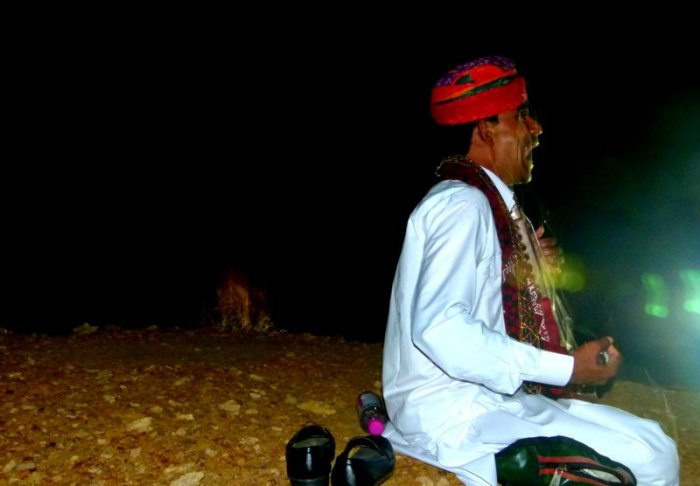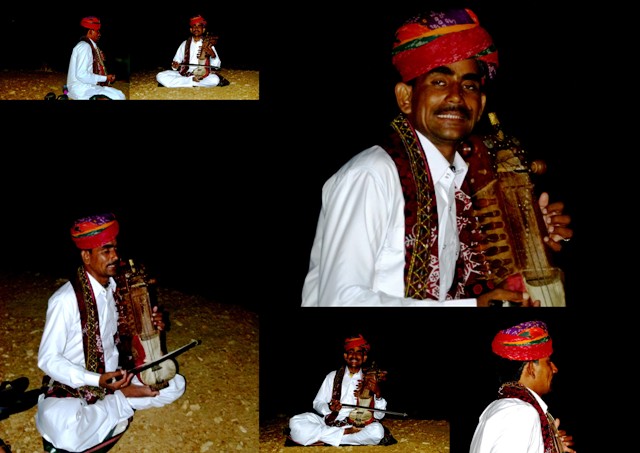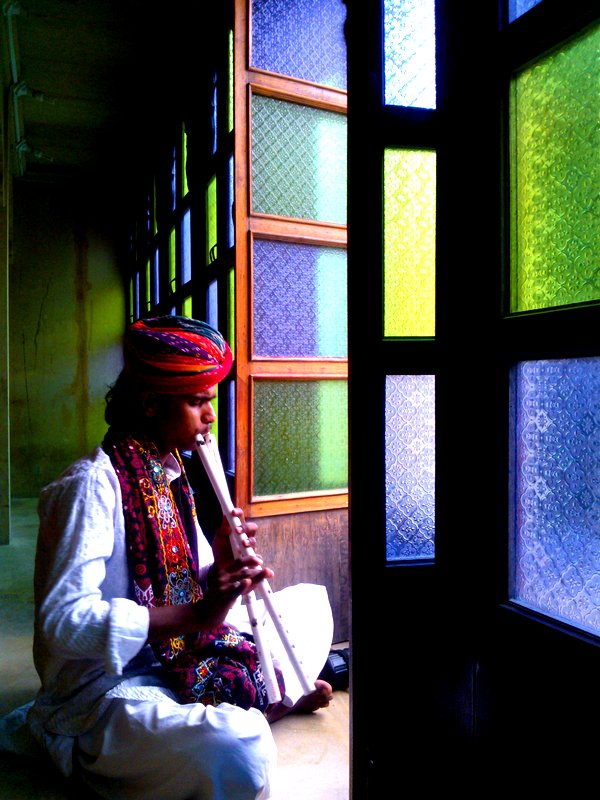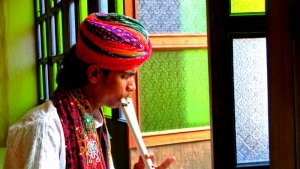It has been almost 3 weeks since my Suryagarh trip, a trip that will go down as one of those trips of a lifetime. Being able to see the incredible monsoon desertscape, to visiting lesser known and popular sights in Jaisalmer, to the food feast laid out for us, to the pampering … everything was special.
But the reason that makes Suryagarh really special was an experience that stood over and above everything else and one that remains with me even today — the incredible music I heard at Suryagarh. Right from the Padhaaro Mhaaro Desh (please click on the song to hear it being rendered by Meelu Khan and Maqsood Khan) that welcomed me to the hotel or the performance of Manganiar musicians during dinner on the first day or the Langha musicians performing during dinner on the second day or hearing Algoza for the first time or discussing Rajasthani folk music…it was music, music and more music all the way.

Music is a quiet passion for me. While I enjoy hearing new kinds of music and am always open to hearing different kinds of music, I rarely seek music, local or pre-recorded, during my travels and Suryagarh was no different. But music was everywhere at Suryagarh and one that enveloped me in its melodious magic. While all the music I heard was truly incredible, two performances stood out for the sheer quality and for the interaction I was able to have with the musicians concerned.
I’ll introduce them to you a little later but for now let us call them the singer at the sand dunes and the musician at the window. Because that is how I first saw them and heard their magical music. My interactions with both of them left me feeling truly blessed and like the chosen one 🙂
The singer at the dunes was Salim Khan. A musician from the Langha community, I met him on my first evening at Jaisalmer, when our group was taken to the nearby dunes for an evening of wine and cheese. It was dark by the time we arrived at the location to see glorious starlit skies right above where we sat and clouds with impressive lightning display in the distance. Right away it was Salim Khan’s soulful singing and his instrument that captured my attention. I went and sat near him to listen to him play.
 He was singing a song on love and longing in Raga Desh. When he finished, we got down to talking about his music and his instrument, the Sindhi Sarangi, which is played only by musicians from his community. I got into a discussion with him on raga-based Rajasthani folk melodies and in my ignorance asked him a rather stupid question: “Why are so many Rajasthani folk songs based on Raga Desh or Raga Mand.”
He was singing a song on love and longing in Raga Desh. When he finished, we got down to talking about his music and his instrument, the Sindhi Sarangi, which is played only by musicians from his community. I got into a discussion with him on raga-based Rajasthani folk melodies and in my ignorance asked him a rather stupid question: “Why are so many Rajasthani folk songs based on Raga Desh or Raga Mand.”
I got a rather tart reply, “Because those are the only melodies people like you want to hear. We have songs in every raga, some of which you may never even have heard of.”
My question spurred him to sing melodies from these different ragas and I was treated to a musical performance where he sang songs in Sorti, Maru, Marwa, Tilak Kamod, Bhimpalas and Khamaj ragas. The rendition in Raga Maru was particularly poignant, as he sang the legend of Dhola and Maru in that raga.

Salim Khan’s music was still resounding in my ears, when I got up all early and bright-eyed the next morning. When I got out of the room, I heard a flute-like sound, but with a difference. It seemed to have a supporting drone. Never having heard anything like this before, I set off to explore the source of the music. When I reached the central courtyard of Suryagarh, I found out the source of this melodious and intriguing sound — the musician at the window.

I took a picture and posted it on my FB page with this description:
Some lovely Ahir Bhairav being played at Suryagarh. Looked around for the source of music and found this musician sitting at a jharokha and playing his flute
Within minutes, I got a response from my musician friend, Milind Date: “That’s not a flute; that’s an Algoza“. Now, I was even more intrigued as I had never heard of such an instrument before. I set off in search of the musician at the window and found him on the first floor of the hotel after a while. He was playing the last notes of a melody in Raga Desh when I walked in on him, startling him. I apologised for disturbing him and requested him to continue playing.

When he finished playing, we got talking. Sikander was the name of the musician at the window, the Algoza player, and he too was from the Langha community. When I asked him about who he had learnt playing the Algoza from, he blushed and said,
“I have not learnt everything. I am still learning and have a long way to go.”
He then proceeded to show me how the Algoza worked. There are two parts to the instrument: one of the “flutes” is played like a regular flute, while the other “flute” produces the drone for a set of notes pertaining to that particular raga. The drone sound is produced by blowing into the “flute” whose openings are plugged with a special clay. Depending on which melody is being played, different openings are plugged.
“Which raga would you like to hear?” Sikander asked me suddenly.
“Anything. I like all that I have been hearing so far,” I replied.
“I’m sure you have not heard anything in Bhairavi yet,” said Sikander. “Would you like to hear a piece in Bhairavi?”
” I would love to,”
Immediately, Sikander got to work on the Algoza, and plugged a few openings in the “flute” that would produce the drone sound. Some experimental notes later, he nodded his head in readiness and satisfaction. I asked for permission to record his music, to which Sikander agreed.
 And then he began playing.
And then he began playing.
And the magic unfolded.
And the goosebumps rose.
And there was just pure music
And time stopped.
When Sikander finished playing, both of us were misty eyed and aware that a rare connection had been made.
Between music and a listener. Between a musician and music lover.
A connection that is impossible to describe in words.
A connection that left me feeling blessed.
Both my interactions with Salim Khan and Sikander made me look at the concept of “travelling for music”. Is this the beginning of the music traveller in me?
Only time will tell.
♦ ♦ ♦ ♦ ♦
Read my other posts from the Suryagarh series:

The chemistry between listener and singer is beautiful. I bet u had a wonderful holiday:)
LikeLike
For me, music is an emotion. And the chemistry that you say is for me an emotional connect with the music, the moment, the divine.
And it was this music that made made my holiday wonderful. 🙂
LikeLike
You know what makes Sikandar great…the fact that he said, ‘I am still learning.’ A true artist and a brilliant performer. Thank you for sharing his music. As I said earlier to you, I have listened and felt a little of the magic that you felt that day.
LikeLike
You’re absolutely right, Atula, about what you have to say regarding Sikander. I hope that musically he grows better and better and achieves great heights and retains the humility in him. He has a rare magic that I have not experienced in a long, long time.
I’m so happy that you liked this music. 🙂
LikeLike
This piece really moved me. I agree, there is so much more to the music we hear if we were only to explore. Have always been a huge admirer of the Langas and now I know more…thanks!
LikeLike
And this was the first time I was hearing the Langhas singing live. Throughout my Rajasthan trip, this time as well as when I visited in February, I heard a lot of superlative music. And I’m sure other regions will have their own music.
Looking forward to explore another side of my country now 🙂
LikeLike
a friend runs a community radio here in Gurgaon and a lot of their programming includes locally recorded music from locals and migrant workers. Love the Bundelkhandi, Maithili and north-eastern music the station captures, for instance! the haryanvi raagini is a bit hard to like, as it isn’t raag-based and a tad high pitched, also words are iportant there and i don’t understand haryanvi much!
LikeLike
I would love to know more about this. Maybe, the next time I’m in Delhi I could get to hear this first hand.
You haven’t written about this, have you?
LikeLike
Nope. I discovered this while doing my research study on migrant workers in gurgaon. Find it fascinating. Would be happy to co write something on this, though film might be the most expressive medium!
LikeLike
Maybe film would be the most expressive medium, but the audio has a magic of its own 🙂
LikeLike
True! I meant to document the lives of migrants along with their cultural expression
LikeLike
What a lovely post, Sudhagee! The sound clip was so moving. I am very choosy when it comes to wind instruments and like only selected musicians playing them, but this was pure magic! Thanks for the info on the instrument. It indeed must have been a very spiritual experience to have heard and absorbed such divine music. Yes, I do hope the music traveller in you has been woken up 🙂
LikeLike
Thank you, Alarmelvalli. I’m so happy that you liked the Algoza. I wish I had thought to record Salim Khan as well, but… I like all instruments, with the possible exception of the nadaswaram; it is the music that I am particular about !
The music traveller in me has indeed woken up and I’m seriously planning a trip around Dikshitar’s Panchabhuta kritis. All I can say now is watch this space 🙂
LikeLike
How is it possible for something made of reed to convey joy, longing, a hint of playfulness all at once? I’m in awe of this musician and the magic he creates. And his enjoyment in the music comes shining through every note. Thanks, my very ordinary day has become extraordinary.
LikeLike
Come to think of it, Meera, I did not ask if the Algoza was made of reeds or some other material.
Kanji Rana, a Jodiya Pava or double flute payer from the Kachchh region, has his flutes made from PVC ! And they sounded divine too. It is the musician and his/her music that breathes life into an instrument, which is why the Algoza piece you heard and liked was so special.
LikeLike
beautiful captures. Informative post. Liked the audio.
http://www.bnomadic.wordpress.com
LikeLike
Thank you, Satyender, Glad you liked the post and the music. 🙂
LikeLike
You made me experience all that you experienced with your lovely words, Sudha! May this be the beginning of many such excursions into different types of music for you. 🙂
Sadly, I am not able to play the music on my system. Trying to figure out how to make it work. 😦
LikeLike
Thank you and thank you, TGND. As I have said earlier, music is an emotion and it connects with each person very differently. And I’m glad that everyone who has commented here has liked it and enjoyed it. I just wish I had thought to record Salim Khan’s incredible music as well.
LikeLike
I was able to play it on a different browser! It is fantastic; totally loved it! 🙂 Thank you so very much for posting this!
LikeLike
😀 You’re welcome. Sharing such good music is what makes it all the more special, isn’t it?
LikeLike
In Sadharnikaran theory or the so-called Indian communication theory, the receiver has raise his/her standards up to reach the communicator through a common understanding of technical aspects and nuances. It is considered a receiver-centered theory. Your post would be a perfect example of how perfect communication happens when receiver drops noise in head and heart and rises up to receive that splendid music in its purest sense. An event where both the sender and receiver are transformed.
LikeLike
I was not aware of the Sadharnikaran theory, but from what you have described my experience seems to be a perfect example. Thank you so much for telling me about this. Does the theory also work for works of art, like say a painting, a sculpture, a beautiful building, or is it restricted to music?
The beauty of music is that the emotions of musician (though an apt terminology, I refuse to use the term giver and receiver here 🙂 ) and the and receiver have to connect at a common level, vibration, plane or whatever word one wishes to give.
I have been fortunate to experience this state a few more times. One of them was a taal vaadya kacheri in Mumbai. It started off as a simple demo and evolved into something else. Imagine 12 percussion instruments in perfect sync with one another. Again another indescribable experience 🙂
LikeLike
The theory applies to all forms of arts–it emerges from treatises on Natyashastra which also have sections on audience behavior to receive the arts. You can read more on this here: http://sadharanikarantheory.blogspot.in/2010/03/fundamentals-of-sadharanikaran-model-of.html
LikeLike
Thanks again, Bhavana, for the link. 🙂
LikeLike
Have you read about the Rasa and the role of Rasiks in the play between the one creating and the one consuming – that describes the relationship between the performer and the enjoyer.
LikeLike
No, Anuradha. I have not read about this. Any suggestions on what I should read ?
LikeLike
As I am writing I am listening to the beautiful haunting music played by Sikander — you are right—it is pure music to my ears. I hope you get many more opportunities to listen to such local renditions. Beautifully written Sudha and thank you for sharing the music. For some reason I could not get any sound when I tried to listen to it on my I Pad.
LikeLike
Thanks, Neena. Very happy that you liked it and felt the same magic that I did 🙂
LikeLike
wonderful post,and wonderful music, Sudha! i usually am really tone deaf, but the music is just beautiful, even i cant understand a word of the ragas and stuff 😦
LikeLike
Thanks, Anu. Music is ultimately an emotion and whether one has knowledge of ragas or not, it gets through to the soul of a person. 🙂
LikeLike
i love to rajasthani music. i am learning trumpet, saxophone music instrument with traveling. musical traveling is very good.
LikeLike
I love Rajasthani music too, though have never heard it being played on the saxophone. I think it would sound good, right?
LikeLike
I am planning for a trip with my friends to Jaisalmer and Jodhpur in Jan end. I am in the USA and have been scouring internet for some amazing musicians. I am so glad I stumbled upon your page. Can you please share more information on contacting these amazing artists so that I can also experience the serenity in person which I am experiencing on my laptop right now? Thanks a lot for this post. You made my day.
LikeLike
Hello Ashish.
Welcome to “My Favourite Things” and thank you for taking the time to stop by and comment here.
I met these artists during a stay at Hotel Suryagarh and have no idea how to contact them otherwise. Maybe you could write to the hotel and they can help in connecting you with the musicians.
Rajasthan is an amazing place for music and you see musicians everywhere. Since you will be going to Jodhpur, do visit mehrangarh Fort: the musicians there are very good as well.
Have a great trip and feel free to write to me in case you want other suggestions.:)
LikeLike
We have booked Suryagadh and Queen Harish for our trip. Hope to have a great experience. Thanks a lot for your blog. I wouldn’t have known about Suryagadh if you had not written about it.
LikeLike
That’s wonderful. Have a great trip and do pass on my regards to the musicians, staff and the manager of Suryagarh, Karan singh.
LikeLike